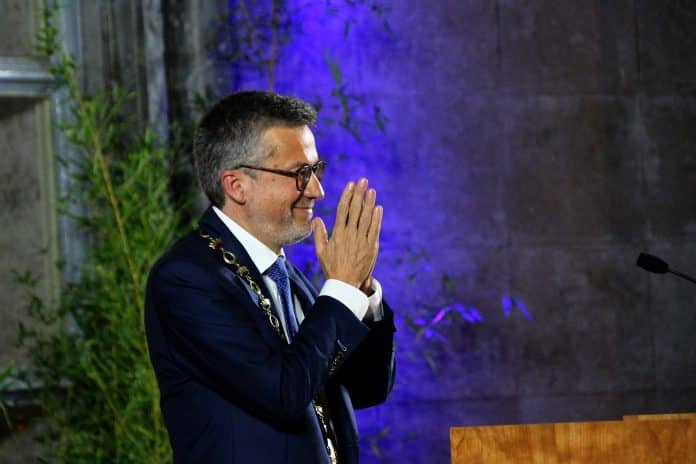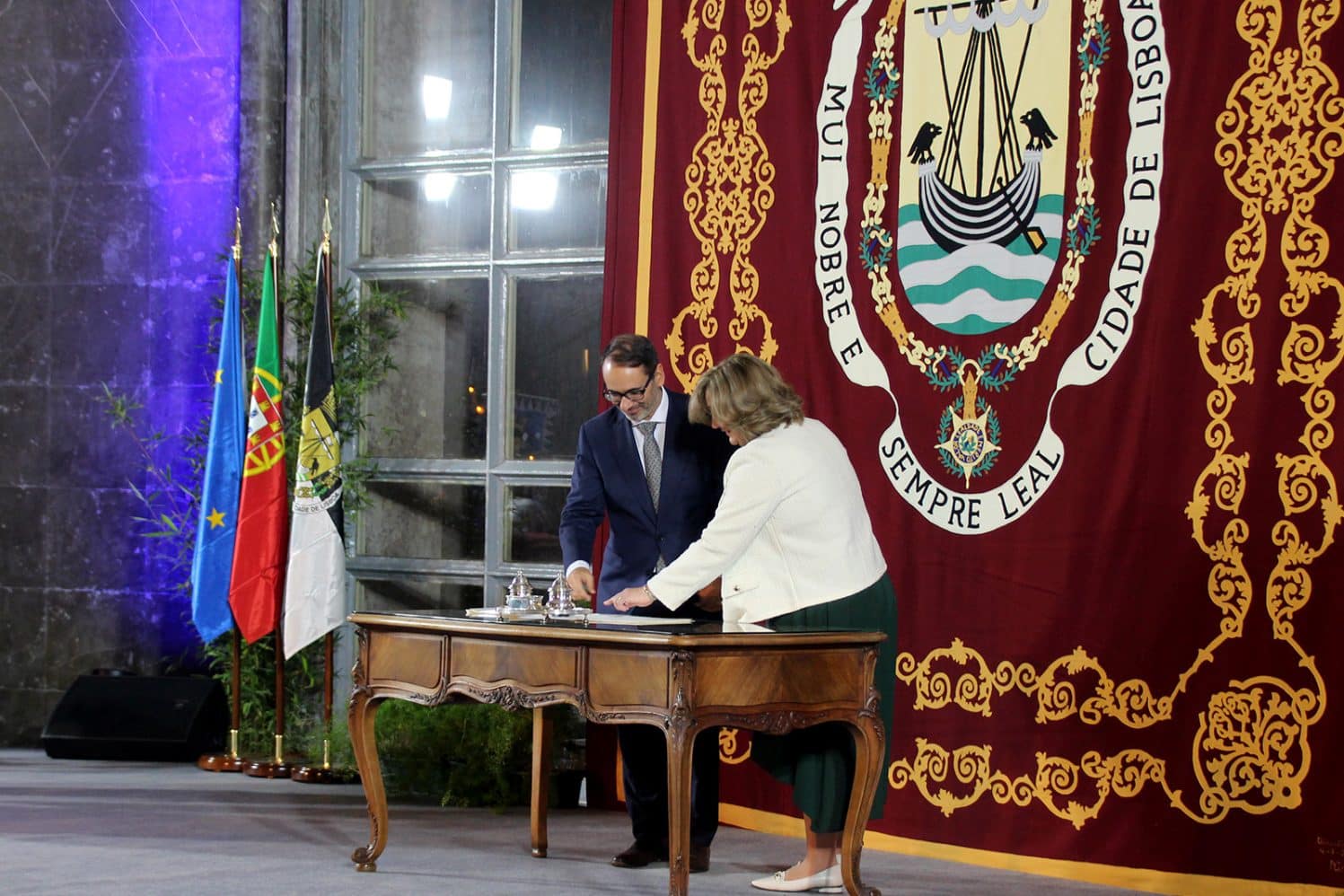
Carlos Moedas took office today for a new term as Mayor of Lisbon. The Social Democrat presented an ambitious governance program that aims to transform Lisbon into the global capital of Social Justice, Innovation and Culture, while also designating housing as the "maximum priority" for this term. In a message to the opposition, he asked that those elected by the people be allowed to govern.
The cream of Portugal's right-wing political sphere and municipalities of the Lisbon Metropolitan Area filled the Alcântara Maritime Terminal today to witness the inauguration of Lisbon's municipal bodies.
Cavaco Silva and Maria Cavaco Silva, Pedro Passos Coelho, Manuela Ferreira Leite, Paulo Portas, but also the new mayor of Porto, Pedro Duarte, who came specifically to Lisbon to attend the inauguration of his Social Democratic party colleague, Mariana Leitão, Inês Sousa Real, João Cotrim Figueiredo, Isaltino Morais, Ricardo Leão, Marco Almeida, among many other prominent names from the Government and local politics, were present at the installation of Lisbon's municipal bodies.
And it was under strong applause that Lisbon Mayor Carlos Moedas (PSD) today assumed the ambition to make the city the global capital of Social Justice, Innovation and Culture.
"If in 2021 I promised you that we would be the European Capital of Innovation and, when no one believed it, we actually were, today we want to be even more, we want to conquer more. In the coming years we want to be, without a doubt, the World Capital of Social Justice, the World Capital of Innovation, the World Capital of Culture, because we are not afraid to dream, we are only afraid that our dreams are too small. And this dream should be not only for Lisbon, but for our entire Metropolitan Area," declared Carlos Moedas in his speech at the inauguration ceremony.
Governs Who Had the People's Vote
Considering that "there would be no democracy that works without stability," the re-elected mayor of Lisbon asked for respect for the popular will and said he would have "openness to dialogue and compromise to fulfill the will of the people, not partisan wills," highlighting openness to dialogue with the opposition to govern.

Carlos Moedas emphasized that Lisbon voters gave him "a clear electoral victory" on October 12 "and reinforced confidence in his political and social project," reiterating that his function is to govern the city "for the common good."
"Some, like me, will do so by governing. Others will do so by exercising opposition functions. This is the nature of democracy and also its richness. [...] The worst we can do to democracy would be to impose our idiosyncrasies on it, and this applies both to those who govern and to those in opposition. Those who exercise government must govern, dialoguing and finding compromises. And those who exercise opposition must let govern, monitoring the actions of those who govern," said the re-elected mayor, arguing that the executive must respect the people's choices.
Considering that "there would be no democracy that works without this stability," Carlos Moedas added that he would have "openness to dialogue and compromise to fulfill the will of the people, not partisan wills."
Housing "Is Maximum Priority"
Regarding intervention areas in the term that now begins, the mayor emphasized that housing "will continue to have maximum priority," particularly youth housing, with 700 homes to be rehabilitated in historic neighborhoods, as well as four new investments that promise to change the housing scenario in the city, namely Vale de Chelas, Vale de Santo António, Casal do Pinto and Quinta do Ferro.
"The new city that is being built is not immediately visible, but it is the one that endures. Just as my predecessors once dreamed of the Expo or Alta de Lisboa," he notes.
But there were no promises of start dates for the works, much less completion dates, because "these are works that will take their time, and I have always said so, but they are works that will make a difference in the city's future. The new city that is being built is not immediately visible, but it is the one that endures. Just as my predecessors once dreamed of the Expo or Alta de Lisboa," he indicated.
Security and Urban Hygiene on the Priority List
For Moedas, security will be another priority intervention area, as the city does not live on security "perceptions" and it is urgent to put more policing on the streets to protect citizens. Carlos Moedas promises to have a more demanding voice, acting "with great firmness," demanding more police from the Government, placing more video surveillance and having night guards again.
"For people, this is a real and concrete issue. It is an issue that worries grandparents, parents and children and we must act in accordance with this concern. In this field, we were and will be even more demanding towards the Government," justifies the mayor.
In the area of urban cleaning, which the opposition considers a real "calamity," the mayor committed to making a true reform of the city's urban hygiene – Moedas integrated councilor Joana Baptista from Oeiras into the executive to change the entire hygiene plan of the city –, proposing "the end of delegation of competences between the City Council and the Parish Councils in cleaning and collection of recycling bins," a measure implemented by the Socialists that has generated a "blame game" between the City Council and parish councils, as well as collection of common garbage six days a week.
Free Screenings for All Lisbon Residents
The mayor explains that city councils do not replace the central State in defining the Welfare State in territories, but advances that he has a plan to strengthen the local welfare state, continuing to build more health centers and nurseries, but also launching a free screening program for lung cancer and colon cancer for all Lisbon residents.
"Just as we did for Lisbon women, who today have access to free mammograms. This is the Local Welfare State we are building in Lisbon," he emphasized.
Ending Zero Licensing
Carlos Moedas has been criticized for the alleged deficit in supervision of the numerous souvenir shops that have taken over the prime areas (and all corners) of Lisbon.
To reverse this trend and "protect local commerce," Moedas promises to fight against "zero licensing" of commerce without rules that is consuming "Portuguese tradition." "It is crucial that the Government puts an end to zero licensing that is destroying the identity of our local commerce," he says.
Carlos Moedas also defends continuing investment in public space, culture, innovation, combating bureaucracy, and mobility and climate action.
"Undefined" Executive
In the October 12 elections, Social Democrat Carlos Moedas was re-elected Mayor of Lisbon through the "Por ti, Lisboa" candidacy – PSD/CDS-PP/IL, which obtained 41.69% of the votes and secured eight mandates, one more than the seven achieved in 2021, falling one short of obtaining an absolute majority, which would require the election of nine of the 17 members that make up the capital's executive.
From the list headed by Carlos Moedas, the following were elected and took office today as councilors: Gonçalo Reis (PSD), Joana Baptista (independent indicated by PSD), Rodrigo Mello Gonçalves (IL), Diogo Moura (CDS-PP), Maria Aldim (CDS-PP), Vasco Moreira Rato (independent indicated by PSD) and Vasco Anjos (IL). From the previous team, Carlos Moedas only maintained the Christian Democrat Diogo Moura, who had assigned portfolios such as Economy and Innovation.
From the "Viver Lisboa" coalition, the following took office for the municipality's council: Alexandra Leitão (PS), Sérgio Cintra (PS), Carla Madeira (PS), Pedro Anastácio (PS), Carlos Teixeira (Livre) and Carolina Serrão (BE).
From Chega, Bruno Mascarenhas and Ana Simões Silva took office. From CDU, communist João Ferreira was elected.
Socialist Returns to Lead Municipal Assembly

After this afternoon's ceremony, André Moz Caldas, from the Socialist Party, was elected president of the Municipal Assembly of Lisbon (AML), in the first meeting of the 2025-2029 term. He replaces also socialist Rosário Farmhouse.
Moz Caldas won the election for the AML Board. He was elected with a six-vote difference over the list led by Margarida Mano, from the PSD/IL/CDS coalition.
Ofélia Janeiro (Livre) is 1st secretary and António Morgado Valente (PAN) is 2nd secretary.


Comments
Join Our Community
Sign up to share your thoughts, engage with others, and become part of our growing community.
No comments yet
Be the first to share your thoughts and start the conversation!